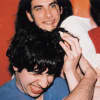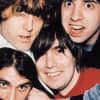Icons of an era call us back to the floor.
In the days leading up to May 21, 2011, countless commutes were buoyed (or burdened) by the promise of sublimation. New York City’s subways, like many mass transit lines throughout the country, were plastered with proclamations of god’s coming judgement—the exact date derived from the apocryphal arithmetic of Harold Camping and his Christian cohorts over at Family Radio. But when “The Rapture” came and went without incident, it seemed that the greatest resurrection might have been for New York’s dance punk messiahs, The Rapture, who’d announced their fourth record—the first in almost five years—just days after the bogus prophecy.
This seemed like an uncharacteristic publicity stunt on the part of the band and their record label, DFA, especially given the album’s title, In the Grace of Your Love, and its religious overtones. But drummer Vito Roccoforte assures me that, “despite getting a ton of hits on Facebook,” all the hoopla was pure coincidence—even if the biblical conceit is fitting. Coming back to DFA after Universal released them from a four-album contract, The Rapture returns to the label like prodigal sons, having undergone the spiritual bankruptcy of signing to a major, only to come back repentant, with their hearts on their sleeves and a fully-completed album in the can.
“Depending on how you look at it, this album took two-and-half years or two-and-a-half months to make,” multi-instrumentalist Gabriel Andruzzi explains, cutting through the chronologic haze of writing, recording, touring and attrition that has consumed the band since their 2006 record, Pieces of the People We Love. Clustered around a small table at a brightly decorated Cuban restaurant in Brooklyn, Roccoforte, Andruzzi and Jenner seem a bit like brothers at a family meal, the conversation easy and fragmented, with the focus primarily on food. Each of the trio’s attention trails off into the distance or towards his phone when the other speaks (they’ve heard these stories a thousand times), facts are either corroborated or corrected—when Jenner explains how they linked up with their producer, Phillipe Zdar, Andruzzi balks, “you seem to be the only one who got that memo!” The sticky tension that’s the glue of any longstanding, deeply felt relationship is as apparent as the filial bond. When the three get up to leave the restaurant, it’s pouring. They stand for a minute contemplating the deluge before setting out onto the street, huddled beneath the canopy of a single umbrella; Andruzzi and Jenner are headed to Steven Alan to buy some pants.
A week later, I meet with Roccoforte alone at his home in Brooklyn, where he’s been nesting with his wife, Keiko, and their one-month-old son, Vito Sota. We ogle the baby’s tiny feet and hypothesize about the growth patterns of peach fuzz on his downy crown, before setting out for the bars, all of which seem to be closed at 4PM. Resigned to the back of a heavily-mirrored cafe, Roccoforte reminisces about their early success. “When ‘House of Jealous Lovers’ came out, everything went fucking haywire,” he explains. “The New York scene had all this heat and every major label—literally every major label in the world—was wanting to sign our band.” Roccoforte is referring to the 2002 single that not only launched their career but also put the then-nascent DFA on the map. The song, an incantatory, slightly nonsensical powerhouse, marked the sea change in early 2000s indie rock, overthrowing the navel-gazing downer balladry that had defined the genre for much of the preceding decade, replacing it with hopped up house energy. It didn’t matter that Jenner’s unhinged vocals were saying something as mindless as house of jealous lovers over and over again, The Rapture was the home team, and they were singing the fight song for a new sound.
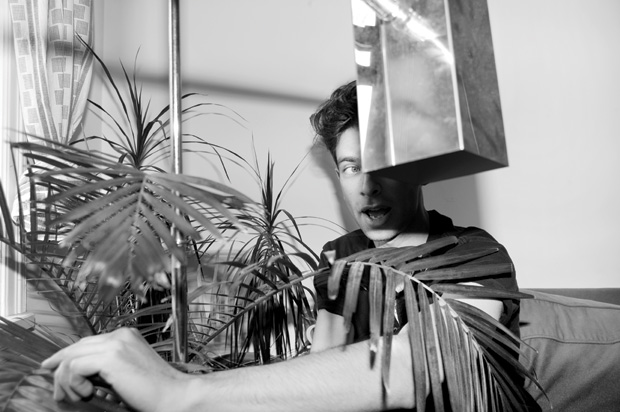
“We were these four young, New York dudes. People were like, Oh yeah, the lead singer looks like Robert Plant.” Roccoforte laughs. “Some of our early reviews were literally talking about jawlines. And you had that whole ‘The Strokes thing’ happening—people saw us as like the ‘disco Strokes.’ It was ridiculous!” In pictures from this era, Jenner’s Adonis curls and doleful blue eyes unmistakably cast him in the role of heartthrob, though Roccoforte also bears the vestiges of rock band cliché, his chin gnarled in a crosshatch of stitches, a scar for which you can still see a trace beneath his “new dad” stubble. The injury, he explains, was from the bad old days of the early 2000s, when he’d woken up in a puddle of his own blood, having been too drunk at a show the night before to know he’d sliced open his chin breaking bottles against a wall (a gash he’d later reopen and compound with a fracture by flipping off the back of a medi-cart at Coachella). Sitting across from Roccoforte, it’s hard to match the picture he paints of his past self with the hyper-mellow dad cradling his infant son just hours earlier. People grow up, have babies, but they still carry the battle wounds of their younger selves.
The band member for whom this is most true, however, is Jenner, the band’s lead singer and Roccoforte’s oldest childhood friend. The two grew up outside of San Diego, and started playing in bands together during high school and throughout Roccoforte’s college years in San Francisco. Jenner lives not far from Roccoforte in an even kid-friendlier neighborhood in Brooklyn. The garden apartment he shares with his wife, Stephanie, and their five-year-old son, Vincent, is warm and peppered with family ephemera. There’s a large, serenely landscaped fish tank that runs parallel the length of the rectangular kitchen table. On top of the table a child’s action figurine sits submerged in a glass of water. Jenner explains that the toy swells to the size of its container, much like a carp to its pond, and our eyes simultaneously dart from the bloated figurine to the voluminous fish tank percolating just beyond, waiting.
There’s a patio that leads back to a shared garden. It’s warm and sunny out, but Jenner opts to stay inside and makes a pot of hot herbal tea. Taking a seat at the kitchen table, he swaddles himself in a protective self-embrace, nearly circling his torso with his long arms. Jenner is not a bombastic and self-assured Robert Plant, but rather his foil: an introverted, moppy-haired man, whose boyish good looks and fine, confident jawline belie a vulnerable melancholy. The few times I’m able to make him laugh—or even look directly into my eyes—feel triumphant. Which isn’t to say he’s closed off. In fact, Jenner’s candid, almost brutal honesty is, at first, a bit disarming. Within the first five minutes of our conversation, he sketches the details of his childhood, much of which were spent battling his mother, who suffered from Bipolar I disorder. “Growing up was like living with this large jungle cat who liked you sometimes and also would maul you every once in a while. At some point, I just had to stop talking to her...it wasn’t safe to continue our relationship.” Unfortunately, it was during one of these bouts of non-communication—and shortly after the birth of Jenner’s son in 2006—that his mother took her own life.
This tragic bit of history is something Jenner grapples with every day. “You know, she’s my mom, so I loved her. She was my best friend when I was a little kid, but she got really sick when I was about five or six, and it definitely got worse [as she got older]. Nobody talked about it in my family, so I just kind of thought my mom was sort of a fuck-up. I wouldn’t allow myself to believe that she actually suffered a lot.” Jenner’s mom was a painter, and Jenner credits her tendency to “disappear into the garage for two weeks and come out covered in oil paints” as influencing his own artistic immersion. For Jenner, music has always been a means of processing his emotions, and, in the early days, this focus predominated around negative catharsis.
“We were surrounded by so many hardcore bands, and it was like, Oh ‘The Rapture,’ that sounds pretty tough,” Jenner explains. “I wanted to project invincibility. ‘House of Jealous Lovers’ came out of that.” You can glean this heady defiance in old footage of the band on YouTube. In one performance of “Notes…” a song from their first LP, Mirror, Jenner barks at the mic, his face pale, puffy and stricken, while Roccoforte attacks his drums and Andruzzi and former bassist Mattie Safer plod and pluck their instruments humorlessly. The song, a pathos-laden pun on Dostoyevsky’s existential classic and the underground music scene, is adolescent and angsty, and, appropriately, performed from a basement. “I think I was depressed for a really long time and I didn’t want to talk about it. Not on the level of my mom, where I wasn’t getting out of bed for days, but this low-level depression.”
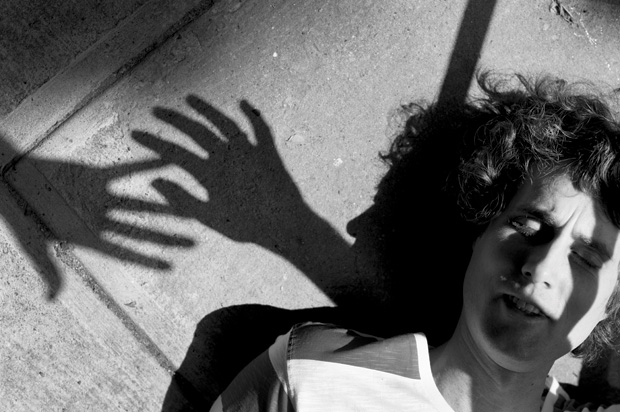
“House of Jealous Lovers,” The Rapture’s bridge between the punk they grew up on and the dance music they were beginning to embrace, was written in 2000, just a year after Jenner and Roccoforte had picked up and moved from San Francisco to New York. It was around that time that they met a pre-LCD Soundsystem James Murphy and Tim Goldsworthy, his founding (and now former) partner in DFA. Though the song was written before DFA technically existed, the duo brought a lot to the table, not only in putting out the single and promoting The Rapture’s sound, but also inoculating the band with what would become DFA’s signature recording style, which Murphy and Goldsworthy infused with a variety of outside sounds and relevant musical quotation. DFA co-founder Jonathan Galkin, who at that time had been convinced to quit his job to help put out the single, points to a track like “Olio,” which appears on both their pre-DFA LP Mirror and the DFA-produced sophomore effort, Echoes, as being a good example of this. The influence of Warp Records’ bleep era house music transforms the dark, droning goth jam of Mirror’s “Olio” into Echoes’ spare house-infused analog: a piano melody layered with bleeping synths and back beats, the guitars all but stripped away. Everyone at DFA had known that The Rapture’s second LP would need to be put out by a larger label, as they didn’t have the money or distribution capabilities, but they didn’t support The Rapture’s decision to go to Universal. Smarting from the loss of time and emotional energy they’d put into helping record Echoes, DFA asked for a portion of the band’s advance as well as some songwriting credits—demands that The Rapture felt, at that time, were unreasonable. Nine years after the fact, though, it seems the majority opinion on both sides is that any acrimony was due to youth and inexperience. “Olio”—along with several other tracks on Echoes—fell into a murky gray area between authorship, collaboration and friendship.
Without the collective synergy of DFA, The Rapture’s stint with Universal was like an awkward adolescence. They had vague ideas about what they wanted their sound to be, but lacked the strength, direction and single-mindedness to produce anything cohesive. “Pieces of the People We Love, to me personally, didn’t feel like we’d stretched out enough or pushed things enough,” says Roccoforte. After Pieces, the band had a brief and strange interlude with Timbaland and Justin Timberlake and recorded a track for the video game Grand Theft Auto IV called “No Sex For Ben.” For Safer, this collaboration felt like a move in the right direction, whereas for the rest of the band it was more of a fluke—a one-off collaboration with a producer they admire, but something that was ultimately not right. “It just didn’t make any fucking sense to me because it was the total antithesis of what I felt musically I wanted to do or what we should be doing,” explains Roccoforte. “It was a total different direction.” On Pieces, Safer sang on almost half the songs, and the band’s sound and direction were getting muddled between two leaders. As Andruzzi sees it, “It’s part of the whole big picture. When you’re in a band with two singers, you’re sort of caught between two singers. Vito and I were kind of like moderators/collaborators.” Vying for artistic space eventually led Jenner to quit the band in the summer of 2008, after they’d wrapped up all their promotion responsibilities for the album earlier that winter. “I felt like my voice wasn’t being heard anymore,” he explains. “I started the band as a creative outlet for what I wanted to do, but Mattie just wanted more and more space.”
During his months away from the band, Jenner worked on finding his own voice and coming to terms with both losing his mother and having a child. He became a Catholic, a church he found literally because his son dragged him inside. “One day he was like, I want to go in there, and so we did and started talking to people and hanging out. I knew that having some sort of ‘practice’ would be helpful, but I didn’t know how to do that.” As he had as an adolescent, Jenner also turned to music for comfort, only this time instead of steeping himself in early ’90s indie hardcore and punk, he started listening to early ’60s black gospel and bluegrass like The Lutheran Brothers, The Blue Sky Boys and The Stanley Brothers, and he joined his church’s choir. This experience deeply influenced his songwriting process, and many of the tracks on In the Grace of Your Love deal explicitly with faith and his relationship with his mother, swinging between a sometimes divine, sometimes damning portrait. In “Miss You” he sings, Never thought I would miss you, but, oh, how I miss you/ Always thought I could forget you but I can’t forget you…/ When I see your face, it just tears me up inside/ I wanna run, I wanna shake out this feeling, this feeling I have for you. Jenner also set out to cultivate a deeper connection to his roots, signing up for popular record database sites like ancestry.com, collecting information from distant relatives and working to strengthen his relationship with his father, whose photo appears on the cover of In the Grace of Your Love. (The photograph, a vintage shot from Surfer magazine, is of Jenner’s father standing “toes on the nose” in a cruciform). He also got weirdly into park league softball.
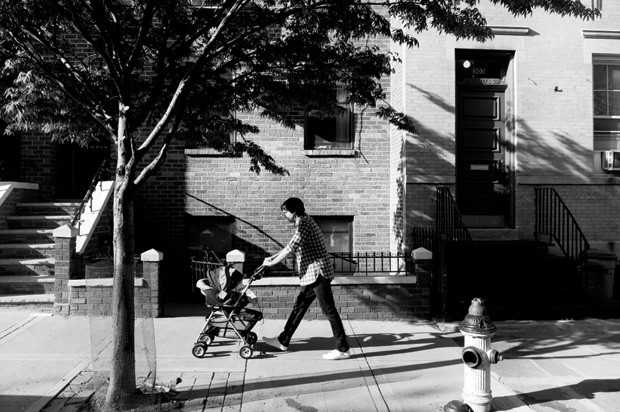
“I remember being out in the park playing softball, and they were having this concert at the Prospect Park bandshell, and I remember hearing this band do sound check. It was really profound moment. I was like, Wait, what am I doing? I came back to the band, and I said I was really sorry, and to please let me come back.” They agreed, but when Jenner returned, it was the beginning of the end for Safer. “At one point, I remember very clearly Mattie saying, ‘What I really want to do is make a record that you don’t play on,’” recalls Jenner. It seems Safer had had his taste of what The Rapture without Jenner might be like, and he couldn’t reconcile it being any other way.
Safer describes his falling out with the band much like one would describe falling out of love. “I think what had sort of been a good creative tension had gone to being a rubber band that’s been stretched too far and has lost its snap,” he says. It was like he and The Rapture had become two different people. Safer explains that their musical interests drifted, and that he’d often come home from band practices and listen to R&B records. “It was something I always tried to bring into the band. I wasn’t alone in that, but I remember bringing in records that were pushed aside, like Earth Wind & Fire, or Motown or Four Tops records. Basically, I just followed the music that was in my heart. And it was something that just didn’t make sense in that context anymore. It needed a life of its own, and that is why I had to leave.” Safer’s yet-to-be-released solo record, a heartfelt collection of R&B songs, feels true to this desire.
After Safer quit the band in April 2009, the threesome regrouped and embarked on “the two-and-a-half month” version of writing the album, essentially starting from scratch. Jenner had written a bunch of songs that he brought to the table, and Roccoforte and Andruzzi had space to spread out and fill in their texture, creating a concrete, driving rhythm that could juxtapose and highlight Andruzzi’s free jazz inflections with more than a few tracks ending in diffuse sax improvisation. “Before, I really felt that my role in the band was to gild things,” Andruzzi explains. “This record was the first time I really contributed to the center or the form across the board.” The band also had the freedom to choose their own producer and settled on the French musician, Phillipe Zdar, who’d just completed work on Phoenix’s Grammy-winning album, Wolfgang Amadeus Phoenix. Zdar had at first demurred, saying he was too tired and burnt out to work, but after hearing the demo, reconsidered and flew out to Brooklyn to do the tracking in December 2009.
That February, The Rapture went to Paris for three weeks to record with Zdar, an experience that seemed to be unanimously positive for both the band and the producer. “Each one of them is like a pillar of the sound,” Zdar explains, in an exuberant, heavily-accented English. “It’s not only one guy who is doing the beat, one as the bass and one who is making the harmony and singing. They are all colliding in some way and bringing something great.” For The Rapture, working with Zdar undoubtedly reignited a flame that had long since extinguished during their time at Universal, reminding them of the old days at DFA—the joy of collaborating with an equal and a friend, but with the strength and maturity to stand on their own, solidly united. The result is a slick and jammy pop album that takes some deeply dark matter and sublimates it hook after hook. There’s a moment on “How Deep is Your Love?” where almost all the synth and rhythm fall away—save for a few soulful handclaps accompanied by a stripped-down piano—and a chorus of Jenner, redoubled, calls out, How deep is your love?/ Oh, how deep is your love?/ How deep is your love? The gospel-inflected call and response is then underscored by Andruzzi’s horn, a slow, psychic trill, which resurrects Roccoforte’s beat, and shines through to the end of the track.
“It comes down to the meaning of life,” Jenner ventures, drawing a broad stroke, which he quickly narrows. “I think intimacy is really what I want in my life. At the end of the day, I’m in a band with a drummer I’ve known since I was nine, and in a lot of ways, that’s what’s kept me alive. It was like my first marriage. We’ve become incredibly faithful to each other. I could make music without this guy, but I don’t want to.” Just as The Rapture could be another kind of band, or be on another kind of label, there’s a point when you go back to the beginning. As Jonathan Galkin tells the story of The Rapture coming back to DFA, “Luke just showed up at the DFA office one day, totally out of the blue...” Older and much clearer about the person he is and the person he wants to be, Jenner expressed his regrets about the past, said he was sorry. But more importantly, he told Galkin about the new Rapture record he really wanted him to hear. “And the next day he and Vito came to the office to play me the record,” Galkin deadpans. “Thank god it was good.”

